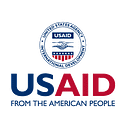Navigating Challenges, Fostering Resilience: CATALYZE’s Adaptive Approach
In the ever-changing landscape of global development, CATALYZE’s flexible project design, robust partnerships, and steadfast commitment to long-term impact has helped USAID address multifaceted challenges, including food crises, conflicts, and economic downturns across various regions. Using financial instruments, such as guarantees, insurance, capital injections, and debt restructuring, USAID CATALYZE has managed risk and continued to mobilize private capital to meet development objectives. Here are a few examples:
Overcoming Insecurity in the Sahel: Localized Solutions for Financial Inclusion
In the Sahel, CATALYZE operates within highly insecure regions, requiring agile and adaptive programming. The growing security crisis in Burkina Faso led several of CATALYZE’s Finance for Resilience (F4R) microfinance institution partners to close their branches. To adapt to this volatile operating environment, CATALYZE connected these institutions with community intermediaries and financial facilitators to help them reach eligible customers in inaccessible areas. This hyper-localized support minimized field travel time and ensured communities can continue to access financing. Financial institutions were able to mobilize financing and monitor loan repayments through this approach.
CATALYZE F4R’s financial institution partners navigated persistent security challenges by instituting additional mobile service points, providing cereal credit to bolster food resilience, fostering collaborations with humanitarian organizations such as the UN Refugee Agency and World Food Programme, and engaging solidarity groups and community resource individuals to oversee credit and collection activities for internally displaced people in Burkina Faso’s East and Centre-Nord regions.
Addressing Political Upheaval in Niger: Adapting to Economic Sanctions
In Niger, a military takeover in July 2023 resulted in economic sanctions imposed by the Economic Community of West African States and the Central Bank of West African States, the closure of borders, and the interruption of electricity resources and cross-border financial transactions. CATALYZE F4R’s local partner, SINERGI, developed a project continuity plan to ensure uninterrupted project operations while safeguarding the team’s well-being. Several FI partners expanded their value chains and focus regions to reduce security risks and continue providing financial products to different demographics.
Tackling Global Geopolitical Turmoil: Fertilizer Shortages and Price Increases
The geopolitical landscape, marked by Russia’s invasion of Ukraine, has disrupted supply chains, increased shipping and fuels costs, and resulted in a dearth of fertilizer exports from Russia, the world’s largest exporter. Countries dependent on those exports now face increased food insecurity. Farmers, agribusinesses, and consumers have all been negatively affected by fertilizer shortages and price increases.
In the past year, CATALYZE implemented several pilot programs in Burkina Faso to improve the availability and accessibility of key agricultural inputs, increase the availability of feed for poultry and small ruminants in target areas, and to inject capital to savings groups. CATALYZE F4R partnered with two animal feed manufacturers in Burkina Faso, subsidizing their cost of accessing credit for working capital and/or investments for capital expenditures. CATALYZE provided the manufacturers technical assistance and injected funds to support the use of new payment mechanisms for agro-retailers in vulnerable regions.
Innovative Capital Injection Programs: Supporting Savings Groups
Inspired by the success of a capital injection mechanism in Malawi, under the USAID Agricultural Diversification Activity project, F4R is implementing a similar capital injection program in Burkina Faso to support 17 Savings Groups with a total of 348 members, with the first capital injection slated for October 2023. Meanwhile, in Ethiopia, CATALYZE launched a $3.5M initiative to enable banks to restructure the debt of farmers and other value chain actors, focusing on increasing farmers’ access to fertilizer, developing strong domestic fertilizer enterprises, and strengthening the market system for long-term resilience. This debt restructuring activity is expected to benefit farmers, agri-SMEs, their workforce, and farmer supply chains.

Adapting to Internal Conflicts: Scoping Mission in Ethiopia
Ethiopia’s internal conflict affected at least four of the key economic regions (Afar, Amhara, Oromia, and Tigray), creating uncertainty and lowering investor confidence. CATALYZE MS4G is conducting a scoping mission to two conflict-affected regions to identify private sector actors, potential stakeholders, and partners in the water, sanitation, and hygiene (WASH) and food security sectors, and to inform programming and regional expansion and reach.
Navigating Investment Challenges: Reprogramming for Impact
Internal conflicts and averse economic climates can lower risk tolerance. Adaptive programming is critical in unsteady investment environments. In Sri Lanka, CATALYZE addressed key challenges that arose from the country’s 2022 economic crisis, including food production, foreign exchange generation, and employment retention. Through collaborative sessions with USAID and stakeholders, CATALYZE shifted its initial sectoral focus from commercial care, apparel, tourism, and food processing to prioritize the food and information, communication, technology (ICT) sectors, which were deemed most critically important to Sri Lanka’s economic recovery and long-term resiliency.
CATALYZE’s flexible design allowed us to introduce a pilot program that paired Investment Advisory Service Providers with micro-, small-, and medium-sized enterprises (MSMEs) at risk of default on their loans to mediate MSME-bank agreements and facilitate loan restructuring. The service providers supported eight MSMEs to restructure nearly $6M in debt, leading to increased financial stability for both the MSMEs and FIs. Following the pilot program’s success, CATALYZE included debt restructuring support as an eligible service under the MSME funding readiness program to address the surge in FI non-performing loans.
CATALYZE continues to learn and adapt to face complex challenges across the 39 countries in which we work. By leveraging innovative financial instruments and collaborating with local partners, the program is making a meaningful impact on global development. To date, we’ve mobilized more than $374.5M in private capital, benefitting 28,663 firms and schools.
